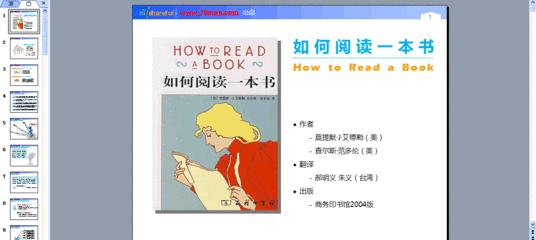如何阅读一本书
仅仅读这本书是无法完成作者留下的作业的。我自己正在读下面的书,我想,只有等到一定的时候才能完全体会到两位大师的良苦用心阿。期待能与他们对话的那一天。
如何阅读一本书:教我们对不同的书要进行不同的分类,有些书只需要第二层的阅读,有些书需要第三层甚至第四层的阅读。认真体会了《如何阅读一本书》,那么,再长的书单也可以读完,不同的方法读不同的书。
荷马-----------伊利亚特、奥德赛
未知-----------旧约
埃斯库罗斯-----------悲剧
索福克勒斯-----------悲剧
希罗多德-----------历史
欧里庇得斯-----------悲剧 特别:美狄亚、希波吕托斯、酒神的伴侣
修昔底德-----------伯罗奔尼撒战争史
希波克拉底-----------医学著作
阿里斯托芬-----------喜剧 特别:云、鸟、青蛙
柏拉图-----------对话录特别:理想国、会饮、斐多、枚农、申辩篇、斐德罗、普罗太戈拉、高尔吉亚、智者、泰阿泰德
亚里士多德-----------全部作品 特别:工具论、物理学、形而上学、论灵魂、尼各马科伦理学、政治学、修辞术、诗学
伊壁鸠鲁-----------致希罗多德信、致梅瑙凯信
欧几里得-----------几何原本
阿基米德-----------所有著作 特别:论平板的平衡、论浮体、沙粒计算
阿波罗尼奥斯-----------圆锥曲线论
西塞罗-----------友谊篇、演说集、论老年
卢克莱修-----------物性论
维吉尔-----------著作 英文版特别:牧歌、农业的?田园诗 、埃涅阿斯纪
贺拉斯 -----------长短句、颂歌集、诗艺
李维-----------罗马史
奥维德-----------著作 特别:变形记
普鲁塔克-----------希腊罗马名人比较列传
塔西佗-----------历史、编年史、阿古利可拉传、日耳曼尼亚志
尼可马修斯-----------算术入门
爱比克泰德-----------金言录、手册
托密勒-----------天文学大成
琉善(路吉阿诺斯)-----------著作 特别:论撰史、真实的历史、待售的哲学
马库思·奥勒留-----------沉思录
盖伦-----------论自然力
未知-----------新约
柏罗丁-----------六部九章集
圣·奥古斯丁-----------著作 特别:论教师、忏悔录、天主之城 、论基督教教义
未知-----------罗兰之歌
未知-----------尼伯龙根之歌
未知-----------尼雅尔萨迦(尼雅尔传)
阿奎那-----------神学大全
但丁-----------著作 特别:新生活、君主国、神曲
乔叟-----------著作 特别:特罗勒斯与克丽西德、坎特伯雷故事集
达芬奇-----------笔记
马基维里-----------君主论、李维罗马史论
伊拉斯谟-----------愚人礼赞
哥白尼-----------天体运行论(De Revolutionibus)
托马斯·摩尔-----------乌托邦
马丁·路德-----------三檄文、桌上谈
拉伯雷-----------巨人传
加尔文-----------基督教要义
蒙田-----------随笔![[转载]【书单】《如何阅读一本书》推荐的书单~ 香港中文大学推荐书单](http://img.aihuau.com/images/01111101/01081333t013795c4ac74dcae4a.jpg)
威廉·吉尔伯特-----------磁石论
塞万提斯-----------堂吉诃德
爱德蒙·斯宾塞-----------预祝婚礼曲、仙后
培根-----------随笔集、学术的推进、新工具、新大西岛
莎士比亚-----------著作
伽利略-----------关于两门新科学的对话、星夜的差使
开布勒-----------哥白尼天文学概要、世界的和谐
威廉·哈维-----------动物心运动的解剖学研究、血液循环、论动物的生殖
托马斯?霍布斯-----------利维坦
笛卡儿-----------方法中的对话、方法论、几何学、第一哲学沉思
弥尔顿-----------著作 特别:英文小诗歌、失乐园、力士参孙、论出版自由
莫里哀-----------喜剧 特别:吝啬鬼、太太学校、恨世者、讨厌自己的医生、塔图弗
帕斯卡-----------思想录、致外省人信札、科学论文集
惠更斯-----------光论
斯宾诺莎-----------伦理学
洛克-----------论宽容、政府论、人类理解论
拉辛-----------悲剧 特别:昂朵马格、费德儿
牛顿-----------自然哲学的数学原理、光学
莱布尼兹-----------形而上学序论、人类理智新论、单子论
笛福-----------罗宾汉
斯威夫特-----------致史黛拉书、格理弗游记、一个木桶的故事、一个小小的建议
康格里夫-----------浮士道
柏克莱-----------人类知识原理
蒲伯-----------论批评、人论、鬈发遇劫记
孟德斯鸠-----------波斯人信札、论法的精神
伏尔泰-----------英国书简、憨第德、哲学词典
亨利·菲尔丁-----------约瑟夫·安德鲁传、汤姆·琼斯
塞缪尔·约翰逊-----------人类欲望的虚幻、英文辞典、拉塞勒斯、诗人传
休谟-----------人性论、道德与政治文集、人类理智研究
让·雅各·卢梭-----------论人类不平等的起源和基础、论政治经济学、爱弥尔、社会契约论
劳伦斯?斯特恩-----------项狄传、在法国和意大利的伤感旅行
亚当·斯密-----------道德情操论、国富论
康德-----------纯粹理性批判、实践理性批判、法的形而上学原理-权利科学、判断力批判、论永久和平
爱德华·吉本-----------罗马帝国的衰亡
包斯威尔-----------伦敦日记、约翰逊传
拉瓦锡-----------化学概要
多位-----------联邦党人文集
边沁-----------道德与立法原理导论、边沁的虚构理论(奥格登编撰)
歌德-----------浮士德、诗与真相
傅立叶-----------热的分析理论
黑格尔-----------精神现象学、权利哲学、历史哲学
华兹华斯-----------诗 特别:抒情歌谣集、露茜组诗、长诗(序曲)
萨缪尔·柯勒律-----------诗 特别:忽必列汗、老水手行
奥斯汀-----------傲慢与偏见、爱玛
克劳塞维茨-----------战争论
司汤达-----------红与黑、帕尔马修道院、爱情论
拜伦-----------瑭璜
叔本华-----------悲观主义的研究
法拉第-----------蜡烛的化学历史、电学实验研究
莱伊尔-----------地质学原理
孔德-----------实证哲学教程
巴尔扎克-----------高老头、欧也妮·葛朗台
爱默生-----------代表人物、爱默生集:论文和讲演集、爱默生随笔
霍桑-----------红字
托克威-----------美国的民主政治
密尔-----------理论学、论自由、代议制政府、功利主义、女性之卑屈、自传
查尔斯·达尔文-----------物种起源、人类的由来、自传
查尔斯狄更斯-----------著作 特别:匹克威克外传、大卫·科波维尔、艰难时世
克劳德·伯纳德-----------实验医学研究导论
梭罗 -----------论公民的不服从、瓦尔登湖
马克思-----------资本论
乔治·艾略特-----------亚当·贝德、米德尔马契
赫尔曼·麦尔维尔-----------莫比迪克(白鲸)、比理巴德
陀思妥耶夫斯基-----------罪与罚、白痴、卡拉马佐夫兄弟
福楼拜-----------包法利夫人、三个故事
易卜生-----------戏剧 特别:海达·高布乐、玩偶之家、野鸭
托尔斯泰-----------战争与和平、安娜·卡列尼娜、艺术论、二十三个故事
马克·吐温-----------哈克贝里·费恩历险记、神秘的来客
威廉·詹姆斯-----------心理学原理、宗教经验之种种、实用主义、彻底经验论文文集
亨利·詹姆斯-----------美国人、奉使记
尼采-----------查拉斯图拉如是说、善恶的彼岸、道德的系谱、权力意志
庞加莱-----------科学与假设、科学与方法
弗洛伊德-----------梦的解析、精神分析引论、文明及其不满、精神分析引论新编
萧伯纳-----------戏剧 特别:人和超人、芭巴拉少校、恺撒和克里奥佩特拉、卖花女、圣女贞德
马克斯·普朗克-----------origin and development of the quantumtheory、Where Is Science Going、科学自传
亨利·伯格森 -----------"时间与自由意志、物质与记忆、创造进化论CreativeEvolution、道德与宗教的两个起源the two sources of morality and religion"
杜威-----------我们怎样思维、民主主义与教育、经验与自然、逻辑:探究的理论
怀特海-----------数学导论、科学与现代世界、教育的目的及其他论文、观念的冒险
桑塔耶纳-----------理性生活、怀疑主义与动物信仰skepticism and animalfaith、人与地persons and places
列宁-----------国家与革命
普鲁斯特-----------追忆似水年华
伯特兰·罗素-----------哲学问题、心的分析、意义和真理研究、人类知识的范围和界限
托马斯·曼-----------魔山、约瑟和他的兄弟们
爱因斯坦-----------相对论的意义、在牛津大学的演讲on the method of theoreticalphysics、物理学的进化
詹姆斯·乔伊斯-----------《都柏林人》中的"死者"、青年艺术家的画像
马利坦-----------艺术与经院哲学、知识的等级、人权与自然法、完整的人道主义
卡夫卡-----------审判、城堡
汤因比-----------历史研究、审判文化
萨特-----------恶心、死无葬身之地、存在与虚无
亚历山大·索尔仁尼琴-----------第一圈、癌症病房
1. Homer (9th century B.C.?)
· Iliad
· Odyssey
2. The Old Testament
3. Aeschylus (c. 525-456 B.C. )
· Tragedies
4. Sophocles (c. 495-406 B.C. )
.Tragedies
5. Herodotus (c. 484-425 B.C. )
· History (of the Persian Wars)
6. Euripides (c. 485-406 B.C. )
.Tragedies (esp. Medea, Hippolytus, The Bacchae)
7. Thucydides (c. 460-400 B.C. )
· History of the Peloponnesian War
8. Hippocrates (c. 460-377? B.C. )
.Medical writings
9. Aristophanes (c. 448-380 B.C. )
· Comedies (esp. The Clouds, The Birds, The Frogs)
10. Plato (c. 427-347 B.C.)
· Dialogues (esp. The Republic, Symposium, Phaedo, Meno,Apology, Phaedrus, Protagoras, Gorgias, Sophist, Theaetetus )
11. Aristotle (384-322 B.C. )
.Works (esp. Organon, Physics, Metaphysics,
On the Soul, The Nichomachean Ethics, Politics,
Rhetoric, Poetics)
12. Epicurus (c. 341-270 B.C. )
·Letter to Herodotus
·Letter to Menoeceus
13. Euclid (fl.c. 300 B.C. )
· Elements (of Geometry)
14. Archimedes (c. 287-212 B.C. )
.Works ( esp. On the Equilibrium of Planes,
On Floating Bodies, The Sand-Reckoner)
15. Apollonius of Perga (fl.c. 240 B.C.)
.On Conic Sections
16. "Cicero (106-43 B.C. )
Works ( esp. Orations, On Friendship, On Old Age)
17. Lucretius (c. 95-55 B.C.)
.On the Nature of Things
18. Virgil (70-19 B.C. )
· Works
19. Horace (65-8 B.C. )
·Works ( esp. Odes and Epodes, The Art of Poetry )
20. Livy (59 B.C.-A.D. 17)
History of Rome
21. Ovid (43 B.C.-A.D. 17)
Works (esp. Aletan1or,phoses)
22. Plutarch (c. 45-120)
· Lives of the Noble Grecians and Romans
Aloralia
23. Tacitus (c. 55-117)
· Histories
· Annals
Agricola
Gemumia
24. Nicomachus of Gerasa (fl.c. 100 A.D.)
· Introduction to Arithn1etic
25. Epictetus (c. 60-120)
· Discourses
Encheiridion (Handbook)
26. Ptolemy (c. 100-178; fl. 127-151)
· Almagest
27. "Lucian (c. l2O-c. 190)
Works (esp. The Way to Write History,
The True History, The Sale of Creeds)
28. Marcus Aurelius (121-180)
· Aleditations
29. Galen (c. 130-200)
.On the Natural Faculties
30. The New Testament
31. Plotinus (205-270)
.The Enneads
32. St. Augustine (354-430)
Works (esp. On the Teacher, .Confessions,
.The City of God, .Christian Doctrine)
33. The Song of Roland (12th century?)
34. The Nibelungenlied (13th century)
(The Volsunga Saga is the Scandinavian version
of the same legend.)
35. The Saga of Burnt Njal
36. St. Thomas Aquinas (c. 1225-1274)
.Summa Theologica
37. "Dante Alighieri (1265-1321)
Works (esp. The New Life, On Monarchy,
· The Divine Comedy)
38. Geoffrey Chaucer (c. 1340-1400)
Works (esp. Troilus and Criseyde,
Canterbury Tales)
39. Leonardo da Vinci (1452-1519)
Notebooks
40. Niccolo Machiavelli (1469-1527)
· The Prince
Discourses on the First Ten Books of Livy
41. Desiderius Erasmus (c. 1469-1536)
The Praise of Folly
42. Nicolaus Copernicus (1473-1543)
· On the Revolutions of the Heavenly Spheres
43. Sir Thomas More (c. 1478-1535)
Utopia
44. Martin Luther (1483-1546)
Three Treatises
Table-Talk
45. Franois Rabelais (c. 1495-1553)
· Gargantua and Pantagruel
46. John Calvin (1509-1564)
Institutes of the Christian Religion
47. Michel de Montaigne (1533-1592)
· Essays
48. William Gilbert (1540-1603)
· On the Loadstone and Magnetic Bodies
49. Miguel de Cervantes (1547-1616)
· Don Quixote
50. Edmund Spenser (c. 1552-1599)
Prothalamion
The Faerie Queene
51. Francis Bacon (1561-1626)
Essays
· Advancement of Learning
· Novum Organum
· New Atlantis
52. William Shakespeare (1564-1616)
.Works
53. Galileo Galilei (1564-1642)
The Starry Messenger
· Dialogues Concerning Two New Sciences
54. Johannes Kepler (1571-1630)
· Epitome of Copernican Astronomy
.Concerning the Harmonies of the World
55. William Harvey (1578-1657)
.On the Motion of the Heart and Blood in Animals
.On the Circulation of the Blood
.On the Generation of Animals
56. Thomas Hobbes (1588-1679)
.The Leviathan
57. Rene Descartes (1596-1650)
· Rules for the Direction of the Mind
· Discourse on Method
. Geometry
· Meditations on First Philosophy
58. John Milton (1608-1674)
Works (esp. .the minor poems, · Areopagitica,
· Paradise Lost, · Samson Agonistes)
59. Moliere (1622-1673)
Comedies (esp. The Miser, The School for Wives,
The Misanthrope, The Doctor in Spite of Him-
self, Tartuffe)
60. Blaise Pascal (1623-1662)
.The Provincial Letters
.Pensees
· Scientific treatises
61. Christiaan Huygens (1629-1695)
.Treatise on Light
62. Benedict de Spinoza (1632-1677)
· Ethics
63. John Locke (1632-1704)
· Letter Conceming Toleration
. Of Civil Government" (second treatise in
Two Treatises on Govemment )
.Essay Conceming Human Understanding
Thoughts Conceming Education
64. Jean Baptiste Racine (1639-1699)
Tragedies ( esp. Andromache, Phaedra)
65. Isaac Newton (1642-1727)
· Mathematical Principles of Natural Philosophy
· Optics
66. Gottfried Wilhelm von Leibniz (1646-1716)
Discourse on Metaphysics
New Essays Conceming Human Understanding
Monadology
67. Daniel Defoe (1660-1731)
Robinson Crusoe
68. Jonathan Swift (16ffl-1745)
A Tale of a Tub
Journal to Stella
· Gulliver's Travels
A Modest Proposal
69. William Congreve (lfflO-I729)
The Way of the World
70. George Berkeley (1685-1753)
· Principles of Human Knowledge
71. Alexander Pope (1688-1744)
Essay on Criticism
Rape of the Lock
Essay on Man
72. Charles de Secondat, Baron de Montesquieu (1689-1755)
Persian Letters
72. Charles de Secondat, Baron de Montesquieu, .Spirit ofLaws
73. "Voltaire (1694-1778)
Letters on the English
Candide
Philosophical Dictionary
74. Henry Fielding (1707-1754)
· Joseph Andrews
.Tom Jones
75. "Samuel Johnson (1709-1784)
The Vanity of Human Wishes
Dictionary
Rasselas
The Lives of the Poets (esp. the essays on Milton andPope)
76. "David Hume (1711-1776)
Treatise of Human Nature
Essays Moral and Political
· An Inquiry Conceming Human Understanding
77. "Jean Jacques Rousseau (1712-1778)
.On the Origin of Inequality
.On Political Economy
Emile
.The Social Contract
78. Laurence Sterne (1713-1768)
· Tristram Shandy
A Sentimental Journey Through France and Italy
79. Adam Smith (1723-1790)
The Theory of the Moral Sentiments
.Inquiry into the Nature and Causes of the
Wealth of Nations
80. "Immanuel Kant (1724--1804)
.Critique of Pure Reason
.Fundamental Principles of the Metaphysics of
Morals
.Critique of Practical Reason
.The Science of Right
.Critique of Judgment
80. Immanuel Kant, continued
Perpetual Peace
81. Edward Gibbon (1737-1794)
.The Decline and FaU of the Roman Empire
Autobiography
82. James Boswell (1740-1795)
Journal ( esp. London Journal)
.Life of Samuel Johnson Ll.D.
83. Antoine Laurent Lavoisier (1743-1794)
· Elements of Chemistry
84. John Jay (1745-1829), James Madison (1751-1836), andAlexander Hamilton (1757-1804)
· Federalist Papers
(together with the · Articles of Confederation,
the .Constitution of the United States, and the
· Declaration of Independence)
85. Jeremy Bentham (1748-1832)
Introduction to the Principles of Morals and
Legislation
Theory of Fictions
86. Johann Wolfgang von Goethe (1749-1832)
· Faust
Poetry and Truth
87. Jean Baptiste Joseph Fourier (1768-1830)
· Analytical Theory of Heat
88. Georg Wilhelm Friedrich Hegel (1770-1831)
Phenomenology of Spirit
· Philosophy of Right
· Lectures on the Philosophy of History
89. William Wordsworth (1770-1850)
Poems (esp. Lyrical BaUads, Lucy poems, sonnets;
The Prelude )
90. Samuel Taylor Coleridge (1772-1834)
Poems (esp. "Kubla Khan," Rime of the Ancient Mariner)
90. Samuel Taylor Coleridge, continued
Biographia Literaria
91. Jane Austen (1775-1817)
Pride and Preiudice
Emma
92. "Karl von Clausewitz (1780-1831)
On War
93. Stendhal (1783-1842)
The Red and the Black
The Charterhouse of Parma
On Love
94. George Gordon, Lord Byron (1788-1824)
Don Juan
95. Arthur Schopenhauer (1788-1860)
Studies in Pessimism
96. Michael Faraday (1791-1867)
Chemical History ofa Candle
· Experimental Researches in Electricity
97. Charles Lyell (1797-1875)
Principles of Geology
98. Auguste Comte (1798-1857)
The Positive Philosophy
99. Honore de Balzac (1799-1850)
Pere Gorlot
Eugenie Grandet
100. Ralph Waldo Emerson (1803-1882)
Representative Men
Essays
Journal
101. Nathaniel Hawthorne (1804-1864)
The Scarlet Letter
102. Alexis de Tocqueville (1805-1859)
Democracy in America
103. John Stuart Mill (1806-1873)
A System of Logic
.On Liberty
· Representative Government
· Utilitarianism
103. John Stuart Mill, continued
The Subiection of Women
Autobiography
104. Charles Darwin (181882)
.The Origin of Species
.The Descent of Man
Autobiography
105. Charles Dickens (1812-1870)
Works ( esp. Pickwick Papers, David Copperfield,
Hard Times)
106. Claude Bernard (1813-1878)
Introduction to the Study of Experimental
Medicine
107. Henry David Thoreau (1817-1862)
Civil Disobedience
Walden
108. Karl Marx (1818-1883)
· Capital (together with the .Communist Manifesto)
109. George Eliot ( 1819-1880)
Adam Bede
Middlemarch
110. Herman Melville (1819-1891)
.Moby Dick
Billy Budd
111. Fyodor Dostoevsky (1821-1881)
Crime and Punishment
The Idiot
.The Brothers Karamazov
112. Gustave Flaubert (1821-1880)
Madame Bovary
Three Stories
113. Henrik Ibsen (1828-1906)
Plays (esp. Hedda Gabler, A Dorfs House,
The Wild Duck)
114. Leo Tolstoy (1828-1910)
.War and Peace
Anna Karenina
What Is Art?
Twenty-three Tales
115. Mark Twain (1835-1910)
The Adventures of Huckleberry Finn
The Mysterious Stranger
116. · .William James (1842-1910)
· The Principles of Psychology
The Varieties of Religious Experience
Pragmatism
Essays in Radical Empiricism
117. Henry James (1843-1916)
The American
The Ambassadors
118. Friedrich Wilhelm Nietzche (1844-1900)
Thus Spoke Zarathustra
Beyond Good and Evil
The Genealogy of Morals
The Will to Power
119. Jules Henri Poincare (1854-1912)
Science and Hypothesis
Science and Method
120. Sigmund Freud (1856-1939)
.The Interpretation of Dreaf1l$
· Introductory Lectures on Psychoanalysis
.Civilization and Its Discontents
.New Introductory Lectures on Psychoanalysis
121. George Bernard Shaw (1856-1950)
Plays (and Prefaces) (esp. Man and Superman, Major Barbara,Caesar and Cleopatra, Pygmalion, Saint Joan)
122. Max Planck (1858-1947)
Origin and Development of the Quantum Theory
Where Is Science Going?
Scientific Autobiography
123. Henri Bergson (1859-1941)
Time and Free Will
Matter and Memory
Creative Evolution
The Two Sources of Morality and Religion
124. John Dewey (1859-1952)
How We Think
Democracy and Education
Experience and Nature
Logic, the Theory of Inquiry
125. Alfred North Whitehead (1861-1947)
An Introduction to Mathematics
Science and the Modem World
The Aims of Education and Other Essays
Adventures of Ideas
126. George Santayana (1863-1952)
The Life of Reason
Skepticism and Animal Faith
Persons and Places
127. Nikolai Lenin (1870-1924)
The State and Revolution
128. Marcel Proust (1871-1922)
Remembrance of Things Past
129. Bertrand Russell (1872-1970)
The Problems of Philosophy
The Analysis of Mind
An Inquiry into Meaning and Truth
Human Knowledge; Its Scope and Limits
130. Thomas Mann (1875-1955)
The Magic Mountain
Joseph and His Brothers
131. Albert Einstein (1879-1955)
The Meaning of Relativity
On the Method of Theoretical Physics
The Evolution of Physics (with L. Infeld)
132. James Joyce (1882-1941)
"The Dead" in Dubliners
132. James Joyce, continued
Portrait of the Artist as a Young Man
Ulysses
133. Jacques Maritain (1882- )
Art and Scholasticism
The Degrees of Knowledge
The Rights of Man and Natural Law
True Humanism
134. Franz Kafka (1883-1924)
The Trial
The Castle
135. Arnold Toynbee (1889- )
A Study of History
Civilization on Trial
136. Jean Paul Sartre (1905- )
Nausea
No Exit
Being and Nothingness
137. Aleksandr I. Solzhenitsyn ( 1918-
The First Circle
Cancer Ward
 爱华网
爱华网



